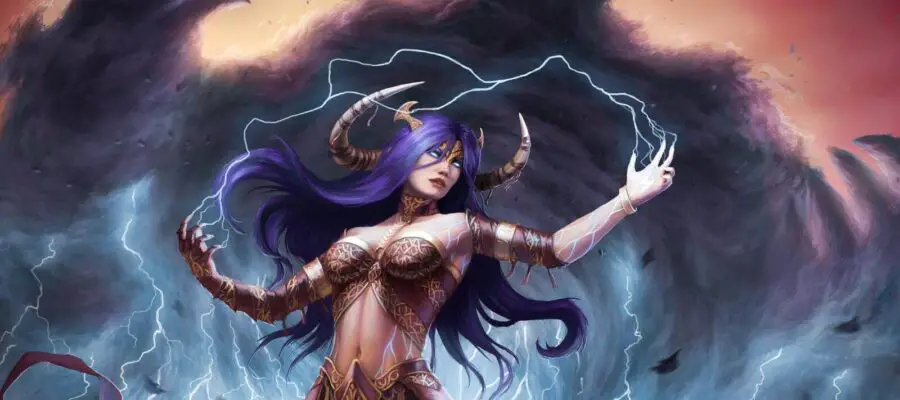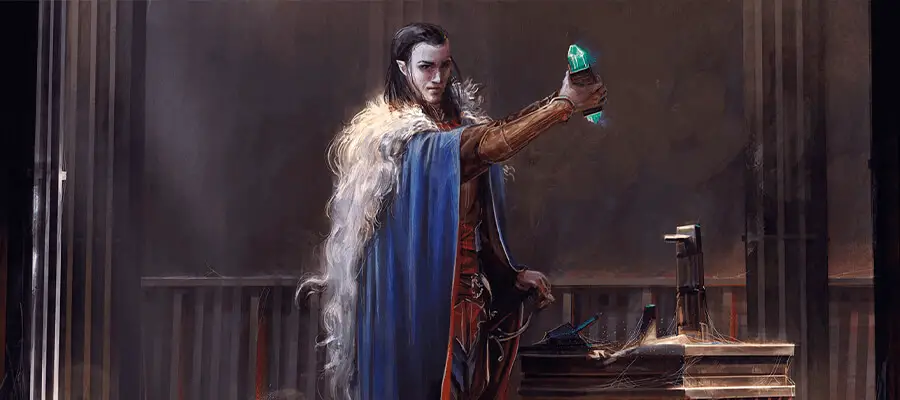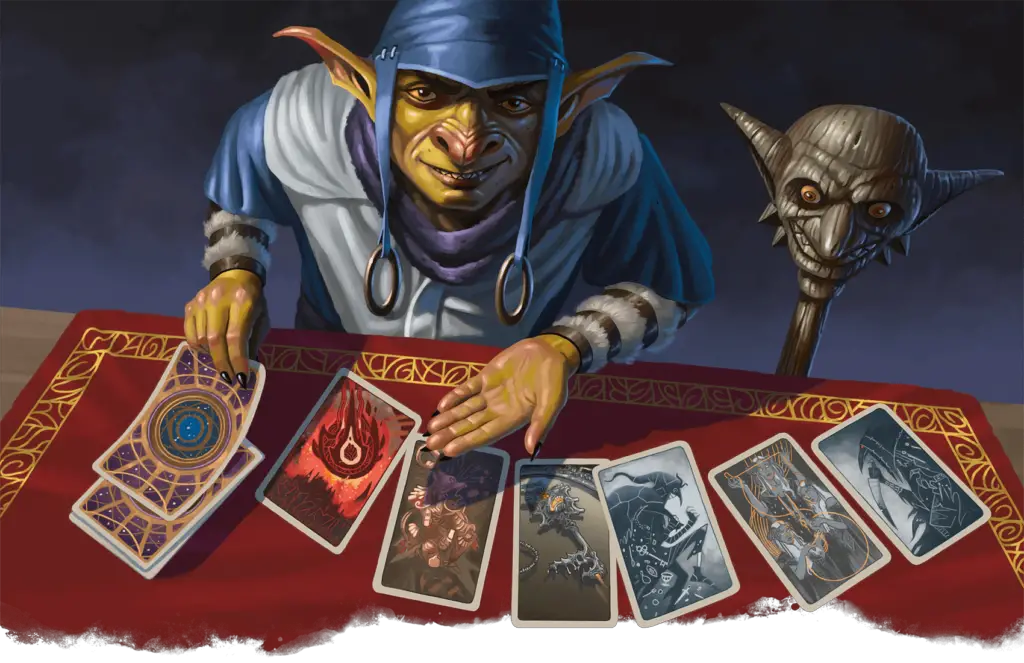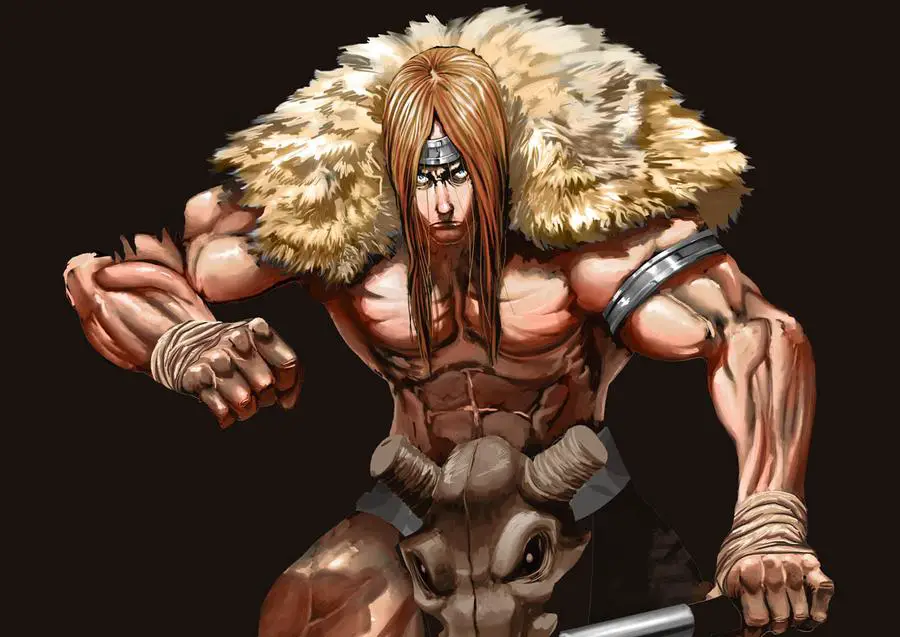Featured enhanced spell comoponent art “Storm Sorceress” by captdiablo. Creative Commons License.
This article contains affiliate links that add gold to our coffers.
It’s an exciting time to play a spellcaster. Tasha’s Cauldron of Everything contains new, powerful magic items for spellcasters, boosting spellcasting DC, spell attack bonus, class features, and more. However, concerns have been raised that players will want the new magic items while neglecting other options that are not direct buffs to their spellcasting. For this reason, some have worried about breaking the game with these items, particularly below level-ten play.
Is there a problem with having magic items that are too good? Since a DM is not required to use overpowered magic items, it’s not a concern of mine. I have an alternative idea though for those who want to freshen up their game without breaking it. It involves a concept that has already been highlighted in the D&D 5e Dungeon Master’s Guide.
Epic Boons and Other Rewards
This article is essentially meant to open every DM’s mind as to how players can be rewarded. You’ll find that much inspiration comes from the section of the DMG beginning on p.227 about how to reward your players without relying on magic items to do so. This section of the DMG gives great advice for character growth and rewards in several varieties:
- Supernatural Gifts (charms, blessings).
- Marks of Prestige (letters of recommendation, parcels of land, favors, medals, special rights, strongholds, titles, training).
- Epic Boons (meant for high-level characters so they can continue progressing, but can be used for any character).
I want to expound on the DMG’s advice, and add my own ideas. I’m particularly interested in talking about how to reward spellcasters with ways to enhance their spells without relying on magic items. This concept is what I’ll refer to as Enhanced Spell Components. Though I’m choosing a narrow focus, you can apply my advice to any sort of unconventional character rewards.
Enhanced Spell Components Conceptually Explained
I have been formulating a concept involving greater spellcasting components. This idea is based on rewarding players with spell components of a higher caliber. For example, the Fireball spell’s normal material components are sulfur and a tiny ball of bat guano. I’m suggesting that a DM can reward a player with refined components that enhance a spell’s potency. Fireball could be cast with guano from a deadly shrieking bat of Madagascar (I made that up). A DM can make the enhanced spell component consumable to limit how many times it’s used, or allow it to persist indefinitely so a character can specialize in the component’s spell.
If this is too limited for your style, you can broaden the enhanced material component to apply to an entire school of magic or any spell that deals fire damage. You can make it do anything you want!
Aside from material components, you could reward a player with enhanced somatic or verbal components to a spell. Perhaps their mastery of a spell will allow them to learn a more potent method of spellcasting by weaving extremely complicated hand movements or tongue twisters. Meeting an archmage would be memorable if the mage taught your party’s spellcaster to cast spells with greater efficacy. Your player would love that archmage forever. It’s fun to convince players to care about NPCs, and learning valuable skills from an NPC will cement that positive relationship.
Mechanical Benefits of Enhanced Spell Components
Now that you understand the concept, how can we pump up our spells with enhanced components? In other words, I need to describe benefits that will properly empower spells with impressive enhancements. I’ve taken inspiration from existing game mechanics and my own ideas. Here are several ideas:
- Upcasting a spell as if cast with a higher level spell slot. The upcasting could be one spell level or more.
- Effortlessly casting a spell without needing a spell slot. This is very powerful as it mimics the Wizard’s level-eighteen ability, Spell Mastery.
- A lesser version of this effect would be to use an enhanced material component, but it lasts for a full minute for each casting of the subject spell. The component burns for one minute and requires concentration while it enhances a spell.
- Alter a spell’s continuous effect to use a bonus action instead of an action, such as with Moonbeam and other similar spells.
- Increase the spell save DC slightly.
- The spellcaster retains a spell slot when a single target passes its saving throw.
- Cast the spell twice instead of once.
- Remove concentration requirements.
- When cast successfully, the spell comes with an additional effect (kind of like Wild Magic, but without the randomness):
- Short-range teleportation.
- The caster gains +2 to Armor Class for one round.
- The ground around the caster becomes difficult terrain.
- Snuff out nearby light sources.
- Reveal invisible creatures within the spell’s area.
- Water around the caster instantly freezes or evaporates.
- Allies gain a point of luck to use on a d20 roll of their choice (basically granting inspiration).
- The caster gains +2 to saving throws for one round.
- Gain temporary hitpoints within ten feet of the spell’s focal point.
Borrow from Metamagic Effects of the Sorcerer Class
- Casting a spell as a bonus action (Quickened Spell).
- Weaving a spell without being perceptible to others (Subtle Spell).
- Sculpting spells to harm your allies less if they’re in the area of effect (Careful Spell)
- Double the spell’s range (Distant Spell).
- Reroll damage dice (Empowered Spell).
- Double a spell’s duration (Extended Spell).
- Targets of the spell have disadvantage on their saving throws to resist the spell (Heightened Spell).
- Alter a damage type (Transmuted Spell).
- Spell attack rolls receive a bonus (Seeking Spell).
- Target two creatures instead of one (Twinned Spell).
Enhanced Component Ideas for Spells:
- Flame Strike: sulfur from a sacred volcano of a Genie, allows upcasting three levels.
- Gaseous Form: Vampire Lord’s tooth, allows casting time to become ‘1 reaction’ triggered by taking damage.
- Levitate: Beholder’s tongue, allows weight limit to be increased to 2,000 lbs.
- Melf’s Acid Arrow: one ounce of Gelatinous Cube, allows twincasting for two targets.
- Dream / Phantasmal Force: Night Hag’s bag of souls, forces disadvantage on the target’s saving throws and skill checks to thwart the spell.
- Polymorph: Pixie dust, allows the target to keep mental stats the same while in a beast form.
- Reincarnate: Phoenix feather, allows the caster to choose the new form instead of rolling for it.
- Fog Cloud: Cloud Giant teaches giant language to gain a flying speed for one round when casting the spell.
- Alter Self: a careless Oni reveals somatic movements that allow the spell to be cast with an indefinite duration while concentrating.
- Darkvision: the players are present during a miraculous healing ceremony performed by a celestial being like a Deva. This results in them gaining darkvision or enhanced darkvision, as if under the effect of the spell of the same name.
Weaving Special Rewards into the Narrative
Once you’ve decided to reward players with enhanced components (or any kind of alternative reward that doesn’t involve magic item attunement), you must identify circumstances that warrant such a reward. You might choose to simply give a player enhanced components as a reward for reaching a high level, maxing out a spellcasting stat, or just being a cool person to play with. For anyone looking for ways to incorporate powerful rewards into their narrative, I have a handful suggestions:
Monster and Lair Yield
Infamous monsters who plague a land and dwell in obscure, dangerous lairs may produce or possess interesting materials and secrets. A Flail Snail is a supreme example of a material-rich creature biology, perfect for harvesting materials if you can stomach the deed. Other creatures may possess secret spellcasting arts if you manage to parley them or fulfill a task for them. A Sphinx is a prime example of a creature possessing ancient secrets, potentially sharing spell enhancing motions and words.
My earlier example was to find exquisite guano from a giant, fierce bat for the Fireball spell. Monsters may cause an environment to yield valuable gemstones that can boost a spell, such as a tunnel dug out by a Purple Worm. The Flame Blade spell could be enhanced by a rare noxious herb to replace the usual sumac leaf, perhaps from a protected elven glade.
Legendary enemies may passively impart power to any adventuring party to slay them. This reminds me of the way Mega Man acquires new weapons from enemy robots once he defeats them.
Acquiring an Ally
Powerful creatures need powerful friends, willingly sharing samplings of their immense might. Dragons, Sphinxes, Couatls, and other monsters who seem as deities to humanoids may not accompany a party or directly aid them in the flesh, but their powers can be granted to players. Dragons may enhance elemental damage of a character’s spells. A Sphinx may share spell weavings to better cast spells. A scribe or monk could also hold the secrets to improved spellcasting, like the Greybeards in Skyrim.
Exploring a Dungeon
The titular hobby of adventurers should yield neat loot, but it can also provide characters with enhancements to their spellcasting. Like the Dragonborn of Skyrim, players can discover ancient runes in a language that grants new and improved powers to characters.
Owning and Utilizing a Spellcaster’s Stronghold
Wealth can be a blessing and a curse. When you don’t have wealth, assets can be difficult to come by. Inversely, having wealth often comes with a shortage of ways to spend it unless the DM uses magic shops and arcane merchants in a campaign setting. I like that Matt Colville and his team created a system in their Strongholds and Followers book (not a sponsorship) that allows spellcasters to own wizard towers and similar strongholds, and employ apprentices to assist with spell research. If your players have abundant wealth or need a reward like this, they can research during downtime to enhance spells or create new ones. Apprentices may experience breakthrough discoveries while the adventuring party goes about its business elsewhere.
Downtime Efforts
Players can seek enhanced components during days or weeks of downtime. They can perform relevant skill checks, particularly Arcana, to succeed on their research and procurement. This would allow for better utilization of the Intelligence-based skill checks. The prospect of a PC discovering their own techniques for improving their spells and abilities will make players feel cool, and characters seem brilliant and fun.
Questing
This one will seem obvious, but you can build entire quest lines around alternative rewards for characters. Some might see these as side quests, but I see them as character development. I think Critical Role does a good job of doing this as Matt prepares entire story lines and plot hooks based on the player characters. Fjord particularly had opportunities I can remember where he gained boons from his Warlock patron as he fulfilled his duties.
Visiting a Magical Realm or Plane of Existence
Characters spending time in other dimensions or planes of existence may find themselves evolving in unexpected ways. Tasha’s Cauldron of Everything has entire subclasses based on this concept. As I learn about the Firbolg race, I’ve found that they’re essentially a giantkin race that became pickled in the fantastical energies of the Feywild.
Heroic Deeds and Epic Boons
(Naruto spoiler alert) I’m reminded of the way Itachi died in the Naruto series where he imparted some of his power to Sasuke. Perhaps a powerful NPC ally to the party dies or otherwise self-sacrifices for the good of the common cause. Instead of mourning the NPC and forgetting about them; give the players a piece of that NPC that will also remind them of their loss: a sample of that ally’s power. This works particularly well with a mentor.
Making Suboptimal, Fun Choices
There’s much discussion about whether a player should make optimal or fun choices as if they’re mutually exclusive. Many Reddit posts have come from DM’s who don’t want a player to feel left behind in the shadow of other player characters who are far superior in many aspects of the game. One way to help such players, whether they be playing for fun or they’re just new, is to give them special abilities that enhance their usually-suboptimal choices.
Spell boosts make excellent rewards in this way. If a character is dealing below-average damage in every combat encounter, give them enhanced spell components that they naturally develop to make up the difference in their spell choices.
Working Closely with a Fellow Spellcaster
Mentors are excellent ways to incentivize players to put time into roleplaying with the campaign’s NPC selection. Knowing that a DM will allow creative enhancements will motivate players to write backstories that have useful people in them. The DM will then reap the free inspiration to use in the campaign. Though the mentor, rival, equal, or otherwise competent person may not always be physically present with the party, they’re useful when they pop up. They arrive on the scene with useful tips and tricks, such as enhanced spell components, to boost party players’ morale and characters’ combat prowess.
Conclusion
Players are often rewarded in the form of magic items that they must attune to, but there are many other ways to reward them. Flex your creativity to give your players benefits that add to the ways they’re playing their characters. Goblins may not possess valuable magic items in their loot boxes, but they may have harvested rare guano from a particularly deadly bat’s cave that could enhance a Fireball spell! There are heaps of methods for rewarding players without departing from your story narrative. An enhanced spell component is one such option for rewarding players. Set aside time in your preparation, fair Dungeon Master, to plan boons and other intangible rewards for your players. You can even learn to improvise such results if you learn the game well enough.
Properly rewarding your players will keep them coming back for more. Even the dullest character can be fun and engaging to play if you constantly freshen up the game and meaningfully introduce new mechanics for your players to experience.





I really love this article and the whole idea with it! I’m all for game mechanics that allow players to really lean in and create a unique character or experience. Giving a caster the ability to tinker with their casting could lead to some really cool thematic moments and should really allow them to get creative with their down time and descriptions of how they cast their spells.
I could even see a couple of my players working to find a way to purely “flavor” their casting. Like a calling card for their magic.
I know you probably have some great articles on tap…but I think a look at how to effectively incorporate pantheons/deity into a game would be really cool. Sometimes I feel like doing stuff like that is shooting in the dark. It’s difficult to find a balance where the interaction isn’t to OP or way underwhelming. Just a thought!
Keep up the great work!
Thank you, Ian! I agree that DM’s have heaps of ways to reward spellcasters without relying on traditional magic items. I think it’s fun to think of concepts this way.
I’ve added your idea to my article queue, so look forward to it within the next few months!
This is excellent stuff. I’m dropping this as treasure in the session I’m prepping right now.
Added to the Blog Database, cross-referenced in two categories!
Recently discovered your blog, and finding lots of good stuff as I dig through your posts.
Added to the Blog Database.